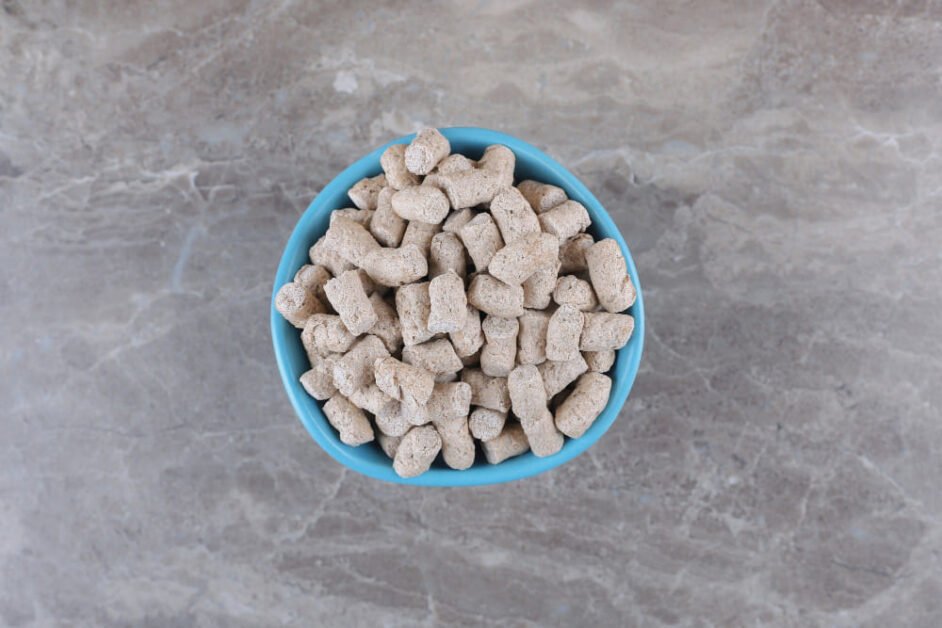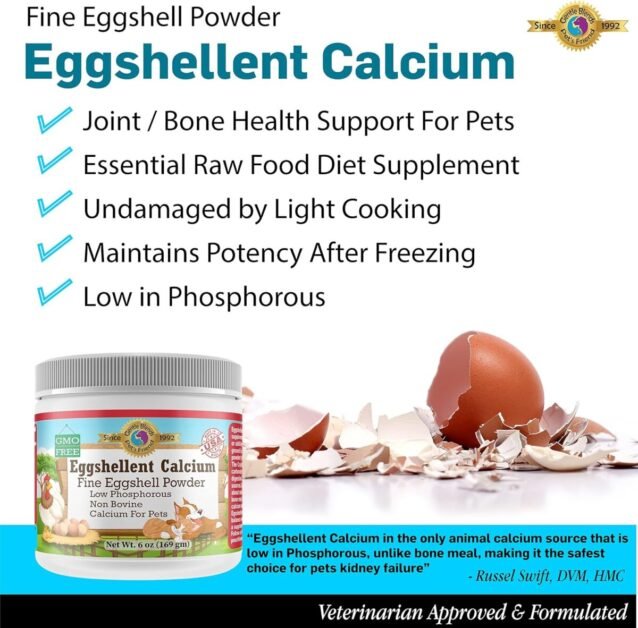Did you know that too much calcium can harm dogs? It can cause kidney problems and bone issues. This shows how important it is to know about calcium supplements for dogs. As pet owners, we must understand how to use them right to keep our pets healthy.
Key Takeaways:
- Calcium is crucial for the growth and development of puppies.
- Senior dogs may benefit from calcium supplementation to support bone health.
- Dogs on homemade diets may require calcium supplementation for balanced nutrition.
- Calcium deficiency can lead to serious health issues, including weakened bones and fractures.
- Pregnant and lactating dogs have increased calcium needs to support the development of puppies’ skeletons and milk production.
Table of Contents
What are Calcium Supplements?

Calcium supplements are special types of calcium used to help dogs with low calcium levels. They come in forms like powders, tablets, and chewables. These supplements often come from eggshells, seaweed, and other natural sources.
Definition of Calcium Supplements
Calcium supplements give dogs extra calcium they don’t get from their food. Calcium is key for strong bones, muscles, and a healthy heart. These supplements can be in the form of calcium carbonate, calcium citrate, or other types to meet a dog’s calcium needs.
Types of Calcium Supplements Available
- Calcium Carbonate: A common type of calcium supplement for dogs, made from eggshells or seaweed.
- Calcium Citrate: This form of calcium supplement is easier for the body to absorb.
- Bone Meal: A natural calcium source, but its effects are similar to supplements and might have unwanted parts.
- Coral Calcium: Not advised because of environmental issues.
Many calcium supplements for dogs also have extra ingredients. These can include glucosamine, chondroitin, and omega fatty acids for more health benefits.
Functions of Calcium for Dogs
Calcium is a key mineral that does many important jobs in a dog’s body. It helps with muscle movement, supports heart health, and aids digestion. This nutrient is vital for a dog’s overall health.
Role in Muscle Movement
Calcium is crucial for strong, working muscles in dogs. It helps muscles contract smoothly, making movement easy and coordinated. Without enough calcium, dogs might have weak muscles, tremors, or seizures.
Importance for Heart Health
Calcium is also vital for a healthy heart rhythm in dogs. It manages the electrical signals that make the heart pump blood. So, dogs need enough calcium to keep their hearts working right.
Aiding in Digestion
Calcium does more than help muscles and heart; it’s also good for digestion. It helps break down and absorb other nutrients, keeping the digestive system running smoothly. Without enough calcium, dogs might have constipation or trouble absorbing nutrients.
The functions of calcium for dogs cover many areas. From role of calcium in muscle movement to importance of calcium for dog’s heart health and how calcium aids in dog’s digestion, calcium is a must for dogs.
- For use in dogs over the age of 12 weeks
- Calcium and Phosphorus supply essential minerals for building and maintaining strong and healthy bones
- Vitamin D (a fat-soluble vitamin) is necessary for proper absorption and balance of calcium and phosphorus

- Excellent Source Of Calcium – Help your furry friend meet their daily calcium needs. Each serving of this dog calcium su…
- Stronger Hips & Joints – Keep your pet’s bones and joints strong with this eggshell powder supplement. Calcium from eggs…
- Easy To Administer – Forget about forcing your dog or cat to swallow large tablets or pills! Just mix 1 teaspoon of this…










- 60 Chewable Tablets
- Roast beef and liver flavor
- Microencapsulated










Recommended Daily Calcium Intake for Dogs
Keeping the right balance of calcium is key for a dog’s health. Adult dogs need about 50 mg of calcium per kilogram of body weight daily. So, a 20 kg dog should get around 1,000 milligrams (or 1 gram) of calcium each day.
General Guidelines by Weight
The amount of calcium needed can change based on the dog’s age, breed, gender, and lifestyle. Here are some basic guidelines for daily calcium intake based on a dog’s weight:
- 5 kg dog: 250 mg of calcium per day
- 25 kg dog: 1,250 mg of calcium per day
- 50 kg dog: 2,500 mg of calcium per day
The Association of American Feed Control Officials (AAFCO) recommends that dog food should have 1.25 grams of calcium per 1,000 calories. Pregnant and nursing dogs, and puppies, might need more calcium for strong bones and muscles.
| Dog Weight | Recommended Calcium Intake (per day) |
|---|---|
| 5 kg | 250 mg |
| 10 kg | 500 mg |
| 20 kg | 1,000 mg (1 g) |
| 30 kg | 1,500 mg |
| 40 kg | 2,000 mg |
| 50 kg | 2,500 mg |
Too much calcium can be bad, so talk to a vet to find out what’s right for your dog. They can help based on your dog’s specific needs and what they eat.
Calcium-Rich Foods for Dogs


Keeping your dog’s calcium levels up is key for their health. Many dog foods have calcium, but processing can lower its effectiveness. Luckily, there are natural foods that can give your dog the calcium they need.
Dairy products like yogurt, cheese, and cottage cheese are great for dogs. A cup of yogurt has about 450 mg of calcium. One ounce of cheese like cheddar or jack has 200 mg.
Fish like tuna, salmon, mackerel, and sardines are full of calcium too. They have 170 mg to 370 mg per serving. But, make sure to cook the fish well to avoid stomach problems.
Leafy green vegetables such as kale, broccoli, and spinach are good for dogs. Also, beans and eggshells (crushed into powder) add a lot of calcium.
Adding these foods to your dog’s diet helps keep their bones, muscles, and health in top shape. Always talk to your vet to see how much calcium your dog needs.
“Proper calcium intake is essential for your dog’s health, and a balanced diet rich in natural, calcium-rich foods can help prevent deficiencies and promote overall well-being.”
Signs of Calcium Deficiency in Dogs
Hypocalcemia, or low blood calcium, is a serious issue in dogs. It happens when there’s not enough calcium in the blood for the body to work right. This can cause symptoms that need quick vet care.
Symptoms of Hypocalcemia
Signs of calcium lack in dogs are clear. They might have muscle spasms, tremors, or seizures. They could also seem tired, not want to eat, and have strange heart beats. In bad cases, they might even fall into a coma.
Treatment of Calcium Deficiency
Treating calcium deficiency works well if done early. Vets will first take blood to check calcium levels and find the cause. This could be kidney failure or pancreas inflammation.
Once they know the cause, they’ll give intravenous calcium and treat other issues. The dog might also need electrolyte support. Then, they’ll start an oral calcium supplement plan.
“Conditions such as vitamin D deficiency, kidney disease, excessive nursing, chronic renal failure, acute pancreatitis, toxemia, and PTH deficiency can lead to calcium deficiency in dogs.”
Quick action is vital for treating calcium deficiency. If not treated, it can be deadly. With a vet’s help, pet owners can get their dogs back to health and prevent serious problems.
Signs of Calcium Overdose in Dogs
Dogs can sometimes take too much calcium, especially from supplements with Vitamin D and K. These supplements help with calcium absorption but too much can cause health problems. Dogs with kidney issues are more likely to face calcium toxicity.
Symptoms of Calcium Toxicity
Here are signs of too much calcium in dogs:
- Vomiting
- Loss of appetite
- Increased thirst and urination
- Constipation
- Muscle weakness
Treatment of Calcium Overdose
How to treat a dog with too much calcium depends on the Vitamin D and K levels. Vets will give intravenous fluids, do blood tests, and watch the dog closely. They might make the dog vomit or clean out the stomach to get rid of the extra calcium. Quick action is key to avoid kidney damage.
| Statistic | Value |
|---|---|
| Toxic amount of vitamin D ingestion | As low as 0.1 mg/kg |
| Hospitalization required | 2-7 days |
| Long-term medication post-treatment | May be required to prevent chronic renal failure |
Pet owners should watch how much calcium and Vitamin D their dogs get. If a dog takes too much, see a vet right away.
calcium supplements for dogs
Many dog owners choose calcium supplements to help their pets’ bones and joints. These supplements are available in powders, tablets, and chewables. They often come from natural sources like eggshells and seaweed.
Types of Calcium Supplements for Dogs
Calcium Carbonate is the most common type of supplement. Sometimes, Calcium Citrate is used too. These supplements may also include Glucosamine, Chondroitin, and Omega fatty acids for extra health benefits.
- LAB TESTED – Each batch of our Seaweed Calcium is lab tested to ensure that its clean with no lead, hormones, or other c…
- ENVIRONMENTALLY SUSTAINABLE – Not only is our Seaweed Calcium environmentally sustainable, but we also package them in 1…
- HIGH DIGESTIBILITY – Smaller feeding amounts needed, reducing overall feeding costs. Easy for both dogs and cats to dige…










- FAST ABSORBING DOG CALCIUM SUPPLEMENT – Calcium Now contains two forms of calcium Calcium Carbonate & Calcium Ascorbate …
- FORMULATED FOR BREEDERS – Calcium Now Whelping Calcium Paste is an essential dog labor supplies to support & maintain st…
- EASE OF USE – Calcium Now calcium paste for whelping dogs is available in a dial-a-dose syringe for more accurate dosing…










- Formerly called Pet-Tabs Calcium
- Chewable Tablets that Dogs LOVE!
- Great for development & maintenance of Healthy Bones and Teeth










- For Stronger Joints, Bones and Teeth: Dogs may develop joint and skeletal problems if they don’t have the right amount o…
- Suited for Dogs of All Growth Stages: Many dogs struggle to eat whole bones. Better Bones is an excellent calcium powder…
- Made from Australian Cattle: Better Bones comes out on top because it’s made from grass-fed, free-range, BSE-free bones….










- Provides the proper balance of essential calcium, phosphorus and Vitamin D3 for stong bones.
- A supplemental source during periods of rapid growth, pregnancy & lactation to keep your pet healthy.
- Great meat flavor that’s easy to feed by hand or can be crumbled into food.










- Highly rated calcium phosphorus supplement for dogs: 365 day guarantee; if you are not happy with our dog bone supplemen…
- Effective calcium phosphorus for dogs: a complete formula to promote bone development in puppies, particularly during th…
- Support for healthy dog bones: Nutrition Strength’s dog bone supplement is made with high quality ingredients, including…










Benefits of Calcium Supplements
Calcium supplements are great for nursing or senior dogs at risk of Osteoporosis. They help with bone health by supporting bone resurfacing and strengthening. But, healthy dogs might not need them unless they have a specific health issue.
Always talk to a vet before adding calcium supplements to your dog’s diet. Too much can cause problems like vomiting, diarrhea, or even kidney failure.
“Calcium supplements for dogs are an excellent option for nursing or senior canines, as these dogs are the most susceptible to Osteoporosis.”
Calcium supplements can be a good choice for dogs in certain situations or with specific health needs. Knowing about the different types and benefits helps pet owners work with their vets to choose the best option for their dogs.


Precautions with Calcium Supplements
Calcium supplements are good for dogs’ health, but be careful with them. Some medicines can react with calcium, causing bad effects. Always talk to your vet before giving your dog calcium supplements, especially if they’re on other meds.
Interactions with Medications
Some common medicines that might not mix well with calcium supplements include:
- Antacids
- Aspirin
- Azole antifungals
- Calcitriol
- Calcium channel blockers
- Cefpodoxime
- Digoxin
- Dobutamine
- Estrogens
- Fluoroquinolone antibiotics
- Levothyroxine
- Magnesium sulfate
- Neuromuscular blockers
- Phenytoin
- Potassium supplements
- Propranolol
- Sucralfate
- Thiazide diuretics
- Verapamil
- Vitamin D analogs
Tell your vet about all the meds, vitamins, and supplements your dog is on. This helps avoid bad reactions with calcium supplements.
It’s important to give your dog the right amount of calcium supplements. Talk to your vet about how much and when to give it to your dog. This helps prevent any side effects.
Natural Alternatives to Calcium Supplements
Dogs can’t make calcium on their own, so they need it from their food. While supplements are easy, natural sources are better for your dog’s health. Here are some great options:
- Dairy Products: Yogurt, cottage cheese, and mozzarella cheese are great for dogs.
- Leafy Greens: Kale, broccoli, and spinach are packed with calcium.
- Fish: Sardines and salmon with bones give dogs a natural calcium boost.
- Eggs: Eggshells are super rich in calcium and can be added to dog food.
- Beans: Legumes like white beans and lentils are good for dogs.
When picking natural calcium sources, make sure they have the right balance of calcium and phosphorus. Also, they should have other important minerals and vitamins. Talk to your vet to find out what’s best for your dog.
“The best way to get calcium into your dog’s diet is through whole foods like dairy, vegetables, legumes, and fish.”
Using these natural sources instead of supplements gives your dog a better way to get calcium. It helps keep them healthy and happy.
Monitoring Calcium Levels
Keeping an eye on your dog’s calcium levels is key. Your vet will check on your pet to make sure the calcium supplements are helping. They’ll test your dog’s blood calcium and look at other important minerals, hormones, and kidney values too.
About 50 percent of blood calcium is free and active. 40 percent is tied to albumin or other ions. The rest is total calcium. Checking these levels helps understand your dog’s calcium balance.
If calcium levels go too low, it can be dangerous. This condition is called hypocalcemic tetany. Seizures can happen when levels are below 4 mg/dl (1.00 mmol/L). Dogs with low calcium might act nervous, get confused, have a fever, muscle tension, and tremors. If it gets worse, they could die.
Most dogs with PTH deficiency start showing signs around 5 years old. Some breeds like toy poodles and German shepherds are more likely to get it. Finding out why calcium levels are low is key to treating it right.
Checking your dog’s calcium levels often helps your vet make sure supplements work. This keeps your dog healthy and safe. By watching closely and working with your vet, you can keep your dog’s calcium levels right. This prevents serious health problems.
Storing Calcium Supplements
Storing calcium supplements right is key for their effectiveness and safety for your dog. Keep most calcium supplements at room temperature, around 77°F (25°C). Make sure they’re away from freezing temperatures. Don’t let them sit in direct sunlight, heat, or moisture. These can break down the active ingredients and lessen the supplements’ strength.
Here are some tips for storing your dog’s calcium supplements well:
- Put the supplements back in their original, tightly-sealed container. This keeps the formula safe and clean.
- Put the container in a cool, dry spot, like a pantry or cabinet. Keep it away from heat and sunlight.
- Check the expiration date and throw away any expired supplements. Old supplements might not work well and could be bad for your dog.
- If the container gets damaged or the seal breaks, move the supplements to an airtight container. This keeps them safe from air and moisture.
- Keep the supplements away from other meds, vitamins, or supplements. This avoids mix-ups and contamination.
By following these tips, you can keep your dog’s calcium supplements safe and potent. This ensures they get the nutrients they need for good health and happiness.
Dosage and Administration
It’s important to give your dog the right amount of calcium for their health. When giving calcium supplements, there are a few things to remember.
Calcium supplements come as tablets, capsules, gel caps, or powder. You can give them before meals or mix them into your dog’s food. If you forget a dose, just give it when you remember. But don’t give two doses at once.
Always follow the dosage advice from your vet or the supplement maker. Giving the right amount of calcium is key. Too much or too little can be bad. Watch how your dog reacts and look out for side effects like constipation.
How to Give Calcium to Dogs
- Determine the recommended dosage based on your dog’s weight and health status, as advised by your veterinarian.
- Administer the calcium supplement either just before or mixed into your dog’s meal.
- If you miss a dose, give it when you remember, but do not double up on the next scheduled dose.
- Monitor your dog closely for any signs of side effects, such as constipation, and report any concerns to your veterinarian.
- Store calcium supplements in a cool, dry place, away from direct sunlight and moisture.
When it comes to how to give calcium supplements to dogs or administering calcium supplements to dogs, always talk to your vet. This ensures your dog gets the right care and dosage.
Conclusion
Calcium is key for dogs, helping with strong bones, muscles, and a healthy heart. Most dogs get enough calcium from their food. But, some may need supplements, like nursing moms, older dogs, or those on special diets. Always talk to your vet to find out what’s best for your dog.
Getting the right amount of calcium is vital for your dog’s health. Standard Process has been making top-notch pet supplements for over 90 years. Their Calcium Lactate tablets have 800 mg of calcium and 160 mg of magnesium per serving. This is great for dogs with issues like calcium shortage, joint problems, or stomach issues.
The right amount of Calcium Lactate tablets depends on your dog’s size. Small dogs (1-20 lbs) should get 1 tablet a day. Medium dogs (21-50 lbs) also get 1 tablet a day. And large dogs (51+ lbs) need 2 tablets a day. With your vet’s help and the right supplements, you can keep your dog healthy and full of life.
































